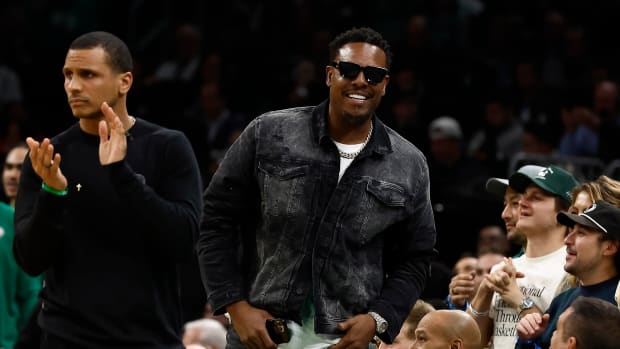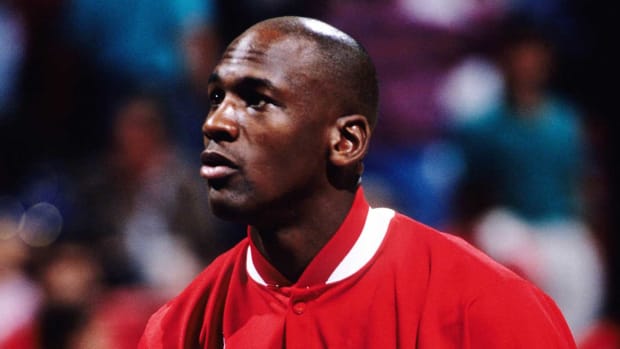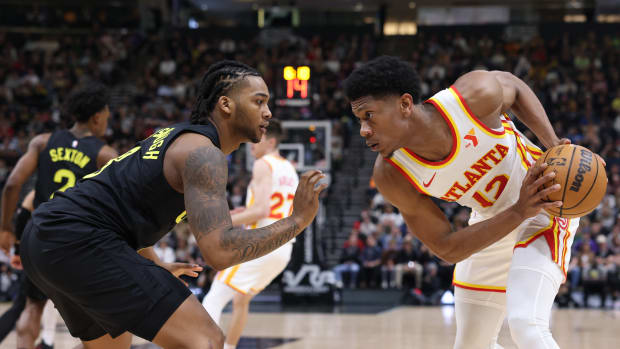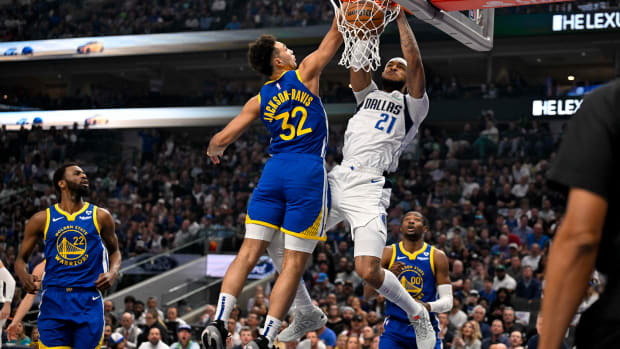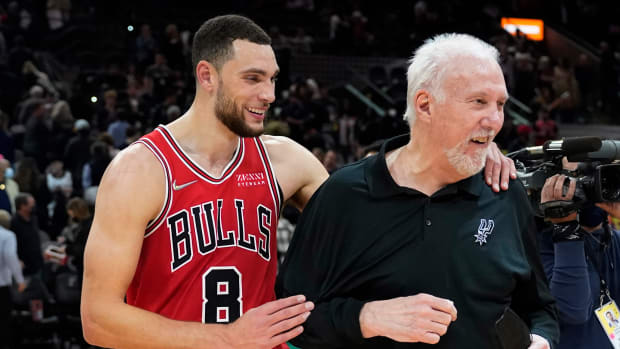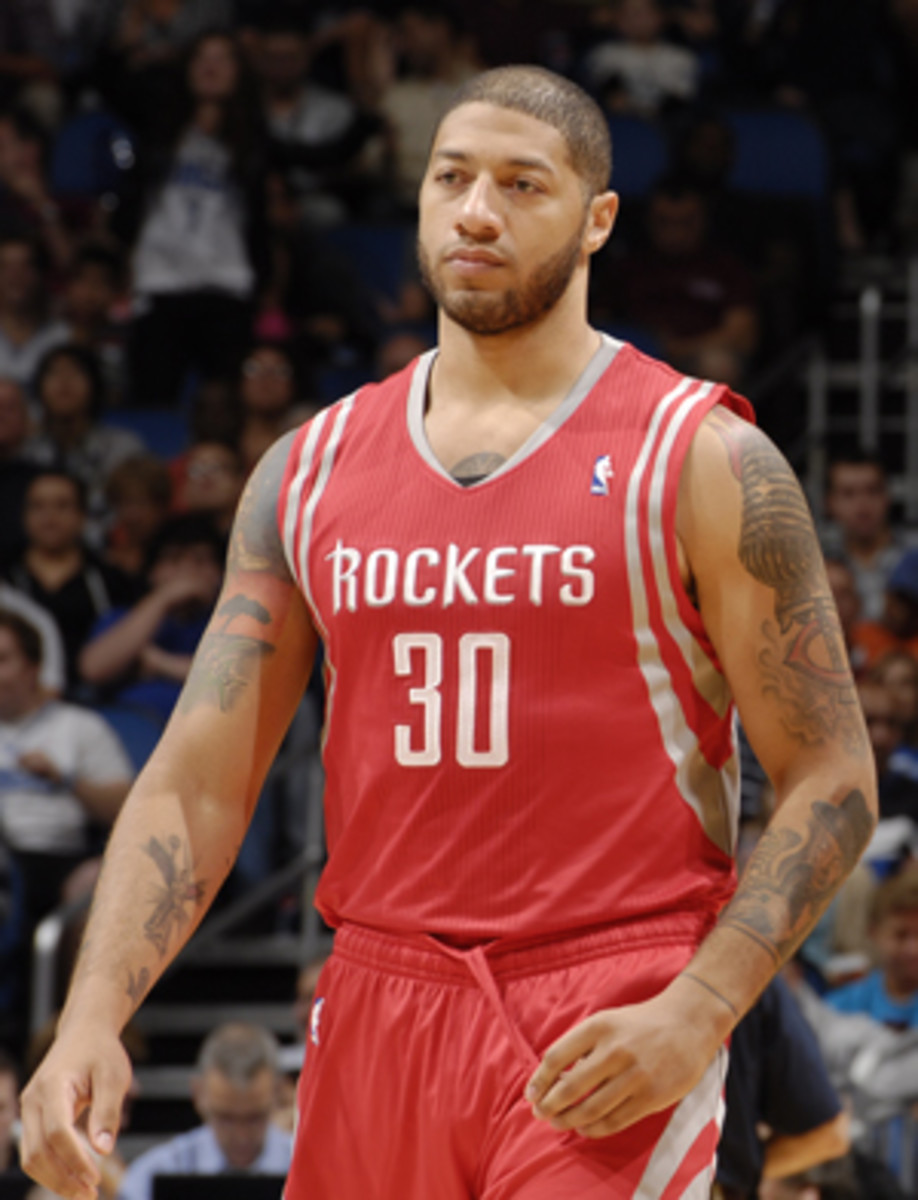
Royce White: I would be 'risking my life' by playing without health protocol
Royce White argues that a mental health protocol is a matter of life and death. (Fernando Medina/Getty Images)
By Ben Golliver
A Real Sports with Bryant Gumbel feature on Royce White, set to air on HBO on Tuesday, reveals documents that shed new light on the rookie forward's dispute with the Rockets.
SI.com obtained an advance copy of the feature, which includes an on-camera interview of White conducted by Bernard Goldberg, excerpts from a five-page letter sent to White by Rockets GM Daryl Morey in November, and a portion of a mental health protocol that White and his doctor drafted and want inserted into his contract.
White, the No. 16 pick in the 2012 NBA Draft, has yet to play for the Rockets this season in a months-long dispute regarding the treatment of his mental health. White suffers from Generalized Anxiety Disorder, panic attacks, Obsessive Compulsive Disorder and a fear of flying. White and the Rockets attempted to fashion a "good faith deal" to manage his health during the preseason and provide special travel arrangements, but White stopped showing up to practices and games in November and refused multiple assignments to the D-League. In January, the Rockets suspended White for "refusing to provide services."
In recent interviews, White has said that Rockets management is "unqualified" to make determinations about his health because they are not mental health professionals and has said the franchise has been "inconsistent" in its support of him. He has sought a mental health protocol that would govern the Rockets' treatment of him and a medical professional who would decide whether he was fit to play. The Rockets, to this point, have limited their public statements, saying that they hope to work with White to get him on the court.
To HBO, White painted the mental health protocol as a matter of life and death.
"If I was an NBA player now without the protocols and safety measures," he said, "I would be risking my health, risking my life. What comes along with mental health if left untreated? Alcohol abuse, marijuana abuse, suicidal behavior, homicidal behavior, those are things I'm not willing to risk to play basketball, to have money, to have fame. That's it."
He also stated that he understood that his hard-line position, which includes adding language to his contract, could cost him his NBA career.
"Yes," he said, acknowledging that he might never play in the NBA. "But I'm not going to accept it without a fight."
In the letter from Morey to White dated Nov. 20, roughly one week after White stopped attending practices and games, the Rockets GM said that his organization had "bent over backwards" to accommodate White's travel requests, noted that White had been less than truthful in disclosing his fear of flying before the 2012 Draft, and indicated that White needed to show up for practices and games "just like any other player."
Here's the excerpt of the letter.
This seems to be a good time for us to step back and think about some of the issues that we have been dealing with over the past few months. As we have told you repeatedly, our goals are for you to be fully integrated into the Team and to have a healthy and productive season, both on and off the court. We have been committed to these goals from the day we drafted you, and have acted consistently with those goals ever since. We have bent over backwards to accommodate your requests and help you meet these goals. At our meeting yesterday, I spent significant time addressing your frustrations. I would like to take this opportunity to further explain how your actions and the changing nature of your explanations for your actions has frustrated our attempts to help you meet your goals. The bottom line is that we remain willing to work with you on issues that arise from legitimate medical need, but you have to come to games, practice and everything else that you are able to do, just like any other player.
To revisit from the beginning, before we drafted you, you told us that your fear of flying was not an issue and that you were ready to be an NBA player. Shortly after we drafted you, you apologized for having to mislead us. You later indicated that you were feeling anxious about flying to the NBA's rookie orientation program this summer. When you missed your scheduled flight, we arranged for a later flight and for Matt Brase to travel with you, working with the NBA to accommodate your concerns. Shortly after that, we informed you that we thought it would be beneficial for you to meet with Dr. Aaron Fink, a world-renowned psychiatrist, who could provide you with access to an appropriate professional in Houston to help should any situations arise. We gave you Dr. Fink's contact information and several available times for an interview.
White admitted that he had missed practices, games and other function but said that his mental health was a "medical reason" for his absence and that it should be excused like any other physical ailment.
"I have not always showed up for practice, but every time I didn't show up for practice, there was a medical reason," he said. "Some player doesn't show up for practice because of his knee, they say he didn't show up to practice because of his knee. [In my case,] they just say he didn't show up for practice [and it sounds like] it's your fault."
Prompted by Goldberg that perhaps many people "wouldn't want to hear" about an anxiety disorder sidelining him, White responded: "I'm sure they wouldn't want to hear that James Harden broke his ankle either, but there's a health reality that exists."
He continued: "If your orthopedist says Royce's left toe has a crack in it, he shouldn't run or jump against the Lakers tonight, you can't run or jump against the Lakers tonight. The only difference is you can't see mine. There's no swelling, so to speak. It's not purple."
The solution to this dilemma, White believes, is "a medical point person who will remain neutral and keep the interests in health," a medical professional who would have the ultimate authority, even over Rockets managements and coaches, to determine whether he is fit to play.
White hoped to formalize this approach by drafting a mental health protocol with his doctor that would be inserted into his contract. A portion of that document was revealed during the HBO feature.
In order for the working conditions to be safe and healthy for someone with mental illness/disability, it is the belief of the medical experts and myself credited for this document that a protocol has to be developed on how to appropriately deal with an individual in respect to mental illness(s)/disabilities from an operational and medical standpoint. A protocol will not only ensure the safe and healthy work conditions for a player like myself with mental illness, but also will lend a system of accountability for both the team and I to use to base what is the appropriate route of action.
Due to the lack of protocol regarding mental illness, this agreed upon document will serve as an addendum to insert into the medical category of the contract and team rules.
Acknowledgment: Acknowledging mental illness/disability as being in the category of medical condition.
The video feature also shows White struggling with anxiety in a number of daily situations. While driving, he admits he's nervous because he's afraid his fellow motorists are texting while driving. Showing off his closet, in which his jackets, shirts and shoes are precisely organized, he says that his hat collection is a particular source of stress.
"My hangers are spaced immaculately, all my suits are facing the same way," he explains. "The item in here of all my clothes and belongings that gives the most anxiety for me is these hats. They're easily misplaced, displaced. It's a round shape on a square hook. Geometrically it messes with me, which is why I'm very careful when I pull them out of the closet. I don't want to have to spend 20 minutes having to fix it. I'd prefer if you don't [touch them]."
He opens up about his fear of flying and says that being on an airplane feels like he's stuck inside a "steel death trap."
"I get nervous when people talk about planes," he says. "Realistically, right now I am nervous talking about it. You ever had butterflies for a long, long time? It starts to build up. Then the other things come, sweaty palms, faster heartbeat, throwing up, almost feeling like I'm going to pass out from being light-headed has come before. All of these things happen before I even get to the airport."
Basketball is not totally omitted. White is shown working out in a gym and reviewing footage of his play for Iowa State during the 2012 NCAA tournament against the University of Kentucky and eventual No. 1 overall pick Anthony Davis. After one sequence, White can be seen on the replay mouthing words to the crowd.
"I said I'm the best player in the country," White remembers. "I knew that at the time. I abused [Davis] all game. I didn't just dunk on him, I abused their whole team all game."
Kentucky beat Iowa State 87-71 before proceeding to win the tournament. White finished with 23 points, nine rebounds, four assists, three steals and one block in 34 minutes. Davis finished with 15 points, 12 rebounds, five assists and two blocks in 40 minutes.
Even with that moment of braggadocio, White's message to HBO was that his approach to his dispute with the Rockets should be perceived on human terms, rather than basketball terms.
"Why does my worth need to be measured by how many rebounds I've clocked? I'm saying something true, why does it need a rebound accompanying it?"
Because you're a basketball player, Goldberg says, supplying the obvious counterargument.































